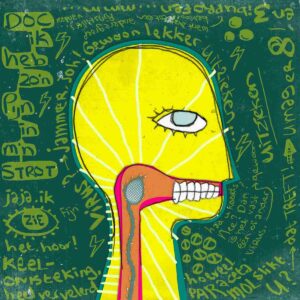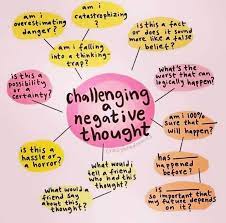Do you know someone who is always obsessively clean or excessively thin? They may be struggling with OCD or anorexia. These disorders can be difficult to recognize, but it’s important to get help if you think someone you know is suffering from them. In this blog post, we will discuss the symptoms of OCD and anorexia, as well as how to get help for someone who may be suffering from them.
Contents
Understanding OCD And Anorexia
 It is important to understand both conditions individually in order to understand how they may interact. Obsessive-compulsive disorder (OCD) is a mental health condition that is characterized by persistent, unwanted thoughts (obsessions) and/or repetitive behaviors (compulsions).
It is important to understand both conditions individually in order to understand how they may interact. Obsessive-compulsive disorder (OCD) is a mental health condition that is characterized by persistent, unwanted thoughts (obsessions) and/or repetitive behaviors (compulsions).
Anorexia nervosa is an eating disorder that is characterized by self-starvation and excessive weight loss. OCD and anorexia are described as comorbid when they occur together. Comorbidity is the presence of two or more disorders or conditions in an individual. In the case of OCD and anorexia, comorbidity means that the individual has both disorders.
Comorbidity of OCD and anorexia is thought to be relatively common. Some estimates suggest that as many as 25% of individuals with anorexia also meet the criteria for OCD. It is important to note that comorbidity does not necessarily mean that one disorder causes the other.
However, there may be some overlap in the symptoms of OCD and anorexia, which can make it difficult to distinguish one disorder from the other. So, seek an accurate diagnosis from a mental health professional.
How OCD And Anorexia Are Related?
It is believed that OCD and anorexia share a similar underlying cause. Both conditions are thought to be the result of an imbalance in the brain chemicals serotonin and dopamine. Along with this, both OCD and anorexia share some common traits and behaviors, in addition, there are some differences between the two. Let’s discuss both in detail:
Common Traits
When you are suffering from OCD, you might have intrusive and persistent thoughts that are unwanted and make you feel uneasy. These thoughts are called “obsessions.” OCD and anorexia are believed to share some similar obsessions, such as:
- A need for perfectionism: This seems very common in people with OCD. They might have an intense need to do everything “right” or “perfect.” People with anorexia might also obsess over their looks or weight, wanting to be perfect in those aspects as well.
- An excessive focus on weight and body shape: Both OCD and anorexia can involve an excessive focus on weight and body shape. For example, someone with OCD might obsess over their weight or body shape in regards to contamination or germs. Someone with anorexia might also have an intense fear of gaining weight.
- A need for control: OCD and anorexia seem to share a common need for control. People with OCD might have a need to control their environment, such as making sure everything is clean or in its proper place. People with anorexia might also have a need to control their food intake or exercise routine.
- Compulsive exercise: It is not uncommon for people with OCD to engage in compulsive exercise. This might be done in an effort to “burn off” the calories from food or to prevent weight gain. People with anorexia might also compulsively exercise in order to lose weight or maintain a certain weight.
These are only a few examples, but you can see how OCD and anorexia share some common traits. It is important to remember that not everyone with OCD or anorexia will have all of these symptoms, but if you do have any of these symptoms, it is important to seek help from a professional.
Differences
Although there are many similarities between OCD and anorexia, there are also some key differences that can help to distinguish between the two disorders.
One key difference is that while people with OCD tend to worry about a variety of different things, people with anorexia tend to focus their anxiety on one specific thing: food. This can manifest in a preoccupation with calorie counting, food restrictions, and other unhealthy eating behaviors.
Another difference is that people with OCD usually realize that their obsessive thoughts and compulsions are irrational, while people with anorexia may see their behaviors as rational and necessary. This can make it harder for people with anorexia to seek help, as they may not believe there is anything wrong with them.
The differences can be much harder to spot in the early stages of either disorder, which is why it’s so important to be aware of the symptoms. However, similar traits can also be helpful in diagnosis. If you or someone you know is displaying any of the above symptoms, it’s important to reach out for help. Early intervention is key in treating both OCD and anorexia, and there are many resources available to get started.
Does Everyone With OCD Have Anorexia?
 There are no such research studies that have been conducted in order to say for certain that everyone with OCD has anorexia. However, it is possible that some people who suffer from OCD may develop an eating disorder as a way of coping with their obsessions and compulsions.
There are no such research studies that have been conducted in order to say for certain that everyone with OCD has anorexia. However, it is possible that some people who suffer from OCD may develop an eating disorder as a way of coping with their obsessions and compulsions.
As OCD and anorexia are both mental disorders, they share some common symptoms. For example, both OCD and anorexia sufferers may have difficulty eating in front of others, may be preoccupied with food and weight, and may engage in compulsive behaviors such as excessive exercise or counting calories.
Moreover, people with anorexia are more likely to suffer from OCD than the general population. In one study, nearly 50% of people with anorexia met the criteria for OCD. This suggests that there may be a link between the two disorders. So there may be chances that someone with OCD might develop anorexia.
If you or someone you know is showing signs of either OCD or anorexia, it is important to seek professional help. These disorders can be very serious and even life-threatening. With proper treatment, however, many people are able to recover and live healthy lives.
How To Treat It?
If people are suffering from both OCD and anorexia, it is important to seek professional help right away. Here are a few ways to get started:
Talk to someone who understands
This is important if you want to get better. Talk to a friend, family member, therapist, or anyone else who will listen and be supportive. Sharing your feelings and struggles can help you feel better and start to take back control. Also, it is important to have someone to talk to who understands what you are going through and can offer helpful advice.
For example, when you share your feelings with friends or family, they may not understand what you are dealing with on a daily basis. They might tell you to just stop worrying so much or to eat more. But talking to someone who has been through it before or is currently going through it can be very helpful.
Get rid of anything that triggers your OCD
Identifying your triggers is an important step in learning how to control your OCD. Once you know what sets off your obsessions and compulsions, you can take steps to avoid those triggers or manage them better. If you’re not sure what your triggers are, keep a journal of your thoughts, feelings, and behaviors for a few weeks.
There are many different types of OCD, and not all of them are related to food or weight. However, if you have an eating disorder, it’s important to be aware of the possibility that OCD may be a factor So, you should identify it first and then get rid of the triggers.
Find a treatment program
There are many different types of treatment programs available. Find one that fits your needs and lifestyle. Because anorexia and OCD are both mental disorders, treatment usually involves talk therapy, medication, or a combination of the two. You can also look for support groups in your area. These groups provide an outlet to share your experiences and connect with others who understand what you’re going through. Some common treatment options include:
- Cognitive behavioral therapy (CBT): CBT is a type of talk therapy that can help you learn to recognize and change negative thoughts and behaviors.
- Exposure and response prevention (ERP): ERP is a type of CBT that helps you face your fears and learn to control your anxiety without engaging in avoidance or compulsions.
- Medication: Medication can be used to treat the underlying anxiety or OCD. Commonly prescribed medications include antidepressants, anti-anxiety medications, and antipsychotics.
Challenge your thoughts
 This is probably the most difficult thing to do when you have OCD and anorexia, but it is also the most important. Why? Because your thoughts are what fuel your obsessions and compulsions, and if you can learn to challenge them, you can start to break free from the cycle of OCD.
This is probably the most difficult thing to do when you have OCD and anorexia, but it is also the most important. Why? Because your thoughts are what fuel your obsessions and compulsions, and if you can learn to challenge them, you can start to break free from the cycle of OCD.
There are a few different ways to challenge your thoughts. One is to ask yourself if there is any evidence to support your thought. For example, if you are obsessing over the idea that you are going to get fat, ask yourself if there is any evidence to support that claim. Chances are, there probably isn’t.
Practice self-compassion
One of the most important things you can do for yourself if you think you may be struggling with OCD and anorexia is to be gentle with yourself. These are both serious illnesses that can take a toll on your mental and physical health, so it’s important to give yourself time and space to heal. Also, try to avoid putting pressure on yourself to “get better” quickly. Recovery is a process that takes time, so be patient with yourself and focus on making progress, not perfection.
In addition to being compassionate with yourself, it’s also important to seek out support from others. Because this can be a very isolating illness, it’s essential to have a support system in place.
Maintain healthy lifestyle
A healthy lifestyle is important for everyone, but it is especially important for people with OCD and anorexia. Eating a balanced diet and getting regular exercise can help reduce symptoms of both disorders and make them easier to manage. Besides this, there are some other important things to keep in mind when it comes to OCD and anorexia.
For people with OCD, it is important to understand that their obsessions are not real and that they can choose not to act on them. This can be a difficult concept to grasp, but it is crucial for recovery. It is also important for people with OCD to learn how to manage their anxiety. This can be done through relaxation techniques and exposure therapy.
So, these are overall some of the ways you can maintain a healthy lifestyle if you suffer from OCD and anorexia. Remember, it is always best to seek professional help if you are struggling to manage your symptoms. With the right treatment, recovery is possible.
Conclusion
In conclusion, OCD and anorexia are serious mental illnesses and both are described as having obsessive and compulsive behaviors. People with OCD often have an intense fear of gaining weight or becoming fat, while people with anorexia often have a fear of losing weight or becoming thin. Both OCD and anorexia can be life-threatening if not treated properly. If you think you may have either disorder, it is important to seek professional help.
In fact, studies have found that with proper treatment, as many as 80% of people with OCD can see a significant reduction in their symptoms. If you or someone you know is struggling with OCD or anorexia, there is hope. So, start on the road to recovery today.
You can also contact Therapy Mantra for more information and resources. We have a team of professional therapists who can provide you with the support and guidance you need to recover from this condition. Contact us today to learn more about our services. You can also book an online therapy or download our free OCD treatment app on Android or iOS.


